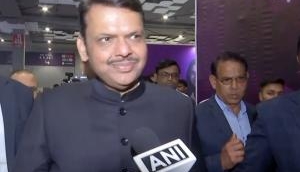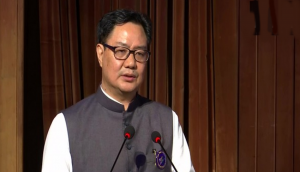
Prakash Javadekar, Union Minister of Environment, Forest and Climate Change on Tuesday used Sanskrit for the first time in United Nations Security Council (UNSC) Debate on climate change.
Starting his UNSC debate on climate change, Javadekar addressed other dignitaries with the Sanskrit hymn from Sukla Yajurveda.
"Om Dyouh shantih, antariksham shantih, prithvi shantih, aapah shantih, oshadhayah shantih, vanaspatayah shantih, vishve devaah shantih, brahma shantih, sarvam shantih, shantireva shantih, saamaa shantiredhi. Om shantih, shantih, shantih."
It translates to Om - May peace prevail in heaven. May peace prevail in interstellar space. May peace reign on the Earth. May the waters be peaceful. May peace be on all the plants and herbs. May peace reign on all the trees and environment. May peace rest with all the divine beings. May the Supreme Being and the scripture be the Abode of Supreme Peace. May peace reign everywhere and in every being. May there be peace and more peace everywhere at all times. May that supreme peace comes to me too (by the grace of the Supreme). Om peace, peace, peace.
Javadekar said that there is no common, widely accepted methodology for assessing the connection between climate change, conflict and fragility.
"Fragility and climate impact are highly context-specific. In addition, both peace and conflict assessments, as well as vulnerability assessments, face significant challenges when it comes to data availability and impact measurement," he said.
"The idea of climate action should not be to move the climate ambition goal post to 2050. It is important for countries to fulfill their pre-2020 commitments. Climate Action needs to go hand-in-hand with the framework for financial, technical and capacity-building support to countries that need it," he added.
Javadekar called for viewing climate change as a wake-up call and an opportunity to strengthen multilateralism and seek equitable and inclusive solutions to "leave a greener, cleaner and sustainable world for our future generations."
The Union Minister stated that India is the only country on track among the G20 nations to meet its climate change mitigation commitments. The Minister further said that India is not only meeting our Paris Agreement targets but will also exceed them. India currently has the fastest-growing solar energy programme in the world.
The Environment Minister said that India strongly believes that the only way to generate persistent, long-term and positive action in the climate change domain is through partnerships by undertaking collective action to make a lasting and sustainable impact.
"The International Solar Alliance (ISA) and the Coalition for Disaster Resilience Infrastructure (CDRI) are two such initiatives by India that have been launched to addressing challenges of climate change and adaptation," he said.
"The impacts of climate change and its associated security risks have important gender dimensions. Women and girls experience the interplay between climate change and peace and security in direct and profound ways. Since women are often the providers of food, water and energy for their families they are likely to face increased challenges in accessing resources due to climate change," he added.
Javadekar pointed out that there is a significant opportunity for countries to integrate low-carbon development in their COVID-19 rescue and recovery measures and long-term mitigation strategies that are scheduled to be announced for the reconvened 26th session of the Conference of the Parties (COP 26) in 2021.
(ANI)
Also Read: JP Nadda to launch Lokkho Sonar Bangla manifesto crowdsourcing campaign tomorrow in Kolkata



_in_Assams_Dibrugarh_(Photo_257977_300x172.jpg)



![BJP's Kapil Mishra recreates Shankar Mahadevan’s ‘Breathless’ song to highlight Delhi pollution [WATCH] BJP's Kapil Mishra recreates Shankar Mahadevan’s ‘Breathless’ song to highlight Delhi pollution [WATCH]](https://images.catchnews.com/upload/2022/11/03/kapil-mishra_240884_300x172.png)

![Anupam Kher shares pictures of his toned body on 67th birthday [MUST SEE] Anupam Kher shares pictures of his toned body on 67th birthday [MUST SEE]](https://images.catchnews.com/upload/2022/03/07/Anupam_kher_231145_300x172.jpg)




_in_Assams_Dibrugarh_(Photo_257977_1600x1200.jpg)

